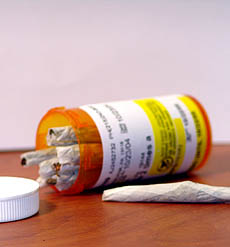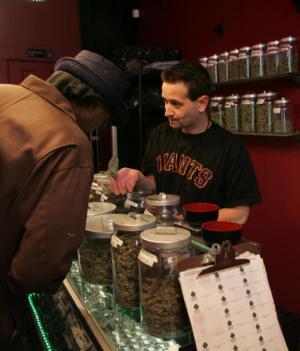 While mai tais on South Beach may be enough for some to kick back on a lazy summer day, a group called The Committee of Sensible Marijuana Policy is lobbying for a marijuana decriminalization measure to be added on the city ballot this November in Miami Beach.
While mai tais on South Beach may be enough for some to kick back on a lazy summer day, a group called The Committee of Sensible Marijuana Policy is lobbying for a marijuana decriminalization measure to be added on the city ballot this November in Miami Beach.
Every
day, 32 people in the United States die in motor vehicle crashes that involve
an alcohol-impaired driver. This amounts to one death every 45 minutes as
stated by the Department of Transportation (US).
Yet,
alcohol continues to be legally accepted since the end of prohibition in 1933.
With the exception of 16 states in the U.S., marijuana is still illegal.
Should
pot be as socially and legally acceptable as drinking cocktails or shots of
tequila at any one of the many bars in Florida?
Stated on their website, The U.S. Drug Enforcement Administration claims that "legalization has been tried before-and failed miserably. Alaska's experiment with Legalization in the 1970s led to the state's teens using marijuana at more than twice the rate of other youths nationally. This led Alaska's residents to vote to re-criminalize marijuana in 1990."
In a previous NEWD article published on October 16, 2009, former nurse educator now ordained Open Bible minister Dyrie Francis argued that with an altered mental state and physical limitations courtesy of marijuana, users cannot fully make a positive difference in their community and world.
But, marijuana proponents persist in asking: is marijuana really the gateway drug for youth, replacing motivation with apathy?
Miami native and
pharmacy technician Guillermo Perez believes it is.
"Marijuana can
be a very dangerous drug when it falls into the hands of a vulnerable person.
It can lead to experimentation with stronger substances. Legalization can
encourage underage use, as does alcohol," said Perez.
of a vulnerable person.
It can lead to experimentation with stronger substances. Legalization can
encourage underage use, as does alcohol," said Perez.
These traditional arguments have not deterred some on the other side of the battlefield. In fact, many see it as their life's call and have dedicated themselves to the fight for legalization.
The Committee of Sensible Marijuana Policy founder, Ford Banistor, first became
involved in the cause to legalize marijuana while working on a dual major in
Criminal Justice and Political Science in Florida Coastal School of Law in
Jacksonville where he eventually earned his Juris Doctor.
After
founding a chapter of Students for Sensible Drug Policy (SSDP) in college,
Banistor founded the Committee of Sensible Marijuana Policy (CSMP) in 2009.
On June 16, members of the organization along with local supporters led a petition drive to place a marijuana decriminalization measure on the November city ballot in Miami Beach.
"The Sensible Marijuana Policy amendment proposed by the CSMP will not legalize marijuana in Miami Beach. The amendment empowers police to issue a civil citation rather than process a misdemeanor arrest and increases the discretion of prosecutors to accept a plea to a civil infraction where appropriate," said Banistor. "Decriminalization will free up police resources to deal with violent crimes and more important matters."
The
CSMP is now petitioning to decriminalize marijuana in Jacksonville Beach,
Atlantic Beach, Orlando, Tallahassee and Miami Beach.
While
the CSMP is rapidly gaining support from the local community, the question
remains whether legalization is just a complement to lazy beach days.
According
to www.cancer.gov, cancer and cancer therapies and their side effects, may
cause a variety of problems for cancer patients. Chemotherapy-induced nausea and vomiting, and anorexia and cachexia are
conditions that affect many individuals with cancer.
The
website goes on to explain that marijuana cigarettes are been used to treat
chemotherapy-induced nausea and vomiting because research has shown that THC is
more quickly absorbed from marijuana smoke than from an oral preparation like a
tea. Tetrahydrocannabinol or THC is  the
main psychoactive substance found in the cannabis plant.
the
main psychoactive substance found in the cannabis plant.
However, any antiemetic effects of smoking marijuana may not be consistent because of varying potency, depending on the source of the marijuana contained in the cigarette.
While some supporters focus on making marijuana legal for medical purposes, others believe that the country could tax off the plant as we do with alcohol and pour money into much needed areas.
Paralegal
and mother of two Connie Estevez believes that legalizing marijuana will be
beneficial to American society.
"More research should be done on the benefits of legalization. We could create more jobs for research and farming of marijuana. We can also tax cannabis and use the money for development of areas in the city that need upgrading," said Estevez.
Other supporters focus in on the decline of crime that would occur by legalizing marijuana and eliminating a sector in the "black market."
Miami native and criminalist Olga Cruz studied theories in decriminalization (the concept of making something that was once illegal now legal) extensively before graduating from Keiser University.
"I
consider the most obvious instance of decriminalization of marijuana, namely in
the Netherlands in 1976 and the effect it has had, I come to the conclusion
that it can work," said Cruz.
"Marijuana,
which was once sold by drug dealers is now grown and sold in coffee shops with
a set of laws and rules, and their system is working," said Cruz. "If a law to
decriminalize marijuana is made in the state of Florid a, or any state, I
believe we need to apply a set of laws and rules to its use. I don't approve
the use of any drug, but sadly in the world we live in today."
a, or any state, I
believe we need to apply a set of laws and rules to its use. I don't approve
the use of any drug, but sadly in the world we live in today."
The
U.S. Drug Enforcement Administration has an answer to the Holland example as
stated on their website.
"The Legalization Lobby claims that the "European Model" of the drug problem is successful. However, since legalization of marijuana in Holland, heroin addiction levels have tripled. And Needle Park seems like a poor model for America," said Cruz.
Prescription
drugs such as opioid painkiller and anxiety medications are considered legal
through the control of doctors and pharmacists. However, a recent article in USA Today reports that prescription
drugs are now the biggest cause of fatal drug overdoses.
On
average, 120,000 Americans a year are going to the emergency room after
overdosing on opioid painkillers.
With numbers rising, we are left to wonder whether legalization is the real issue at hand. Or, are drugs just a nuisance hiding a far bigger problem in our society?

